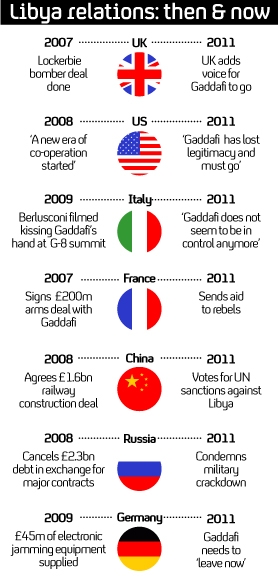Libya crisis: world relations with Gaddafi grow cold
As world leaders unite against the Gaddafi regime, Channel 4 News looks at the billion dollar deals and “friendship pacts” now hitting the skids, as John Sparks blogs on a nervous Europe.

As David Cameron floats plans for a no-fly zone to be imposed over Libya, leaders across the world are upping the anti-Gaddafi tempo.
“We must not tolerate this regime using military force against its own people. In that context I have asked the Ministry of Defence and the Chief of the Defence Staff to work with our allies on plans for a military no-fly zone,” the prime minister said earlier.
Germany‘s Foreign Minister, Guido Westerwelle, has suggested a blanket 60-day freeze on all the payments into Libya to force the country into financial submission. The country has widespread unemployment and many Libyans rely on government handouts to live. The protests have already taken their toll on food stocks and healthcare provisions in the north African country.
This [attacks on civilians] could constitute crimes against humanity and must stop. Luis Moreno-Ocampo
‘Nothing is off the table’
US Secretary of State Hillary Clinton has warned Muammar Gaddafi that in terms of action against Libya, “nothing was off the table”. She edded: “Gaddafi and those around him must be held accountable for these acts, which violate international legal obligations and common decency.”
The International Criminal Court has announced that it is now gathering information about civilian deaths in Libya and has been in contact with the army for help before making a decision on whether formal proceedings can star for indictments to be raised for crimes against humanity.
Luis Moreno-Ocampo, ICC’s Chief Prosecutor, said: “Information suggests that forces loyal to President Moammar Gaddafi are attacking civilians in Libya. This could constitute crimes against humanity and must stop.”
He added that there would be no level of impunity for those suspected of such crimes.
Nervous Europe watches Libya, blogs John Sparks
After three months of confusion and hesitation, the French government has decided to get behind the pro-democracy movement in the Arab world. It must have been difficult - France has enjoyed years of close relations with autocrats in the region, particularly those running former French colonies.
This is not a story unique to France - other European countries have done the same thing, offering North African regimes trade and investment deals and bestowing plenty of legitimacy on them in the process.
In return, the Europeans got "immigration control" - a promise to hold back the people of Africa (or at least the young and ambitious, clamoring for a piece of the pie).
Read more from the Channel 4 News World Blog
Libya’s isolation comes at a cost
The hard-line statements from members of the UN fraternity and international court followed earlier sanctions from the 27 EU member states freezing all the assets of Gaddafi, his family and government as well as an arms embargo and blanket ban on visas for the leader and his closest advisers. In essence Libya’s ruling class is being put under seige within an ever-narrowing territory.
The instant turning against Libya in this crisis has put to bed multiple trade and political deals with some of the world’s biggest and most influential powers. The sanctions unanimously agreed upon will have costly ramifications across the globe and highlights how until recently there was widespread support for trade with the extremist regime.
In 2008, the US admitted that “differences remained [between the two countries] but they had started a new era of co-operation”. Only a year before, the UK had negotiated a deal with Gaddafi over the Lockerbie bombing, creating a cordiality that halted Libya’s funding of terrorist regimes across the globe and a promise not to pursue development of WMDs.
Read more – Tony Blair has spoken to Gaddafi, Mandelson confirms
France had similar trade connections and licence deals as the UK, but have themselves also condemned Colonel Gaddafi’s regimes and agreed to the measures. In 2007 the French agreed a £200m arms deal with Gaddafi. Their neighbours Italy, and former colonial power in Libya, had obvious intrinsic ties with the country, especially through trade, symbolised when Silvio Berlusconi was pictured kissing Gaddafi at the G8 summit in 2009.
China, considered one of the nations who might have steered away from agreeing to the UN sanctions, have also shown solidarity against Libya. They entered a £1.3bn railway deal with Libya in 2008. Russia, who had similar multi-billion deals on the table with Libya, have also agreed to the UN statement of intent.
Whilst Germany’s Andrea Merkel has been a driving force during all the dialogue, re-enforcing her nations stance that Gaddafi must “leave now”, it will mean the end of deals with them and the Libyan regime, an example of which being their £45m deal to supply electronic jamming equipment in 2009.